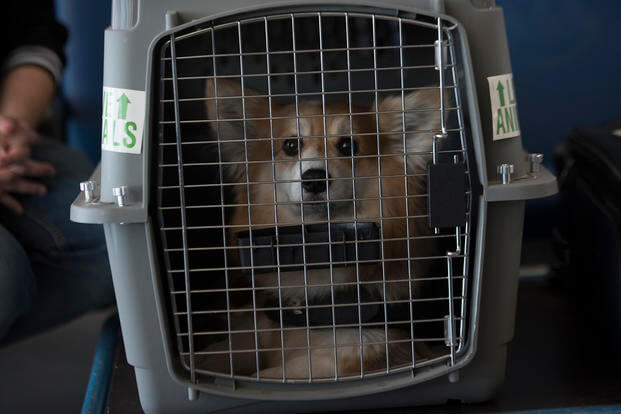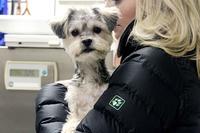Moving across the country or around the world can be stressful, and flying with a cat or dog can make the experience even more complicated.
Troops and families can begin preparing a pet for travel before receiving notice of a permanent change of station (PCS) to lessen the stress when moving day arrives.
If health records and vaccines are not up to date while moving overseas, for example, an otherwise unnecessary quarantine may be placed on an animal, with associated costs.
While pet PCS costs haven't traditionally been reimbursed, they may soon be covered under a provision of the 2023 National Defense Authorization Act.
Meanwhile, preparation can help lower the stress of moving a furry friend.
Plan Ahead to Fly with Your Pet
Pets traveling from one country to another usually must have a health certificate from a veterinarian. Due to the frequency of summer moves, base vet clinics may extend their hours over the months preceding the busy PCS season to help people who are taking their pets.
Keep in mind that some countries ban certain types of pets or require a quarantine period.
Owners are responsible for all pet shipment requirements, such as documentation, immunization and country pet entry provisions. Owners must provide a U.S.-approved International Air Transport Association (IATA) kennel. The cage must be large enough for the animal to stand up, turn around and lie down with normal movements. Rules governing pet travel are very specific, and travelers should pay close attention to them and plan accordingly.
When transporting pets, be sure to do the following:
- Make arrangements for transportation well in advance.
- Carry health and rabies certificates with you.
- Ask about vaccinations needed to travel to foreign countries.
- Attach an ID tag to your pet's collar.
- Check on the type and size of kennel needed for overseas shipment of pets.
Flying with Pets on Air Mobility Command Flights
Once you know where you're moving, you can start planning to take your pet along in the pressurized passenger area of an Air Mobility Command (AMC) Patriot Express flight. Here are some things to expect:
- Defense Department regulations allow for a maximum of two pets per family (dogs and cats only) to travel with their owners on AMC flights.
- Pet reservations for AMC flights may typically be made from 90 days to 120 days before the month of the flight.
- The pet and carrier are limited to a combined total of 150 pounds. In-cabin kennels, which must be stowed under the seat in front of the passenger, can't exceed 18 inches long by 11 inches wide by 10.5 inches tall.
- The cost is $125 per pet up to 70 pounds, paid at the owner's expense. Pets between 71 pounds and 140 pounds cost $250 per pet; and pets between 141 pounds and 150 pounds cost $375.
Flying Your Pet Back to CONUS
If you are transporting your pet from a foreign country to the continental U.S. (CONUS), see the military veterinarian on your base to make sure you have all the information you need to get your animal(s) out of the country.
Pets may also have to be inspected by the customs service in the country from which they are departing. Base veterinary clinics and animal rights groups can provide more information and help set up a transportation plan for pets.
Required documents usually include:
- A veterinary health certificate (DD 2209), which must be issued within 10 days of your departure.
- A rabies vaccination certificate (DD 2208), which must be issued at least 30 days prior to your departure but cannot be more than one year old.
Flying with Your Pet on a Commercial Airline
Pet travel may be problematic, depending on the season. Summer months are typically high-travel months, and space is at a premium.
If no pet space is available on an AMC flight, you may have to travel on a commercial airline, with the pet traveling as accompanied baggage in the cargo hold of the aircraft. Some U.S. air carriers enact "pet embargos" from May to September, barring pets because temperatures on the tarmac can heat up the cargo hold dangerously.
Service members should confirm all pet travel arrangements in the event of short notification by airlines, which could change pet shipment plans. A simple phone call to check can make all the difference.
Keep Up to Date for Your Next PCS
Get the inside information from those who know. Get PCS help and all the news and benefits information you need delivered straight to your inbox. Sign up for a free membership today.














